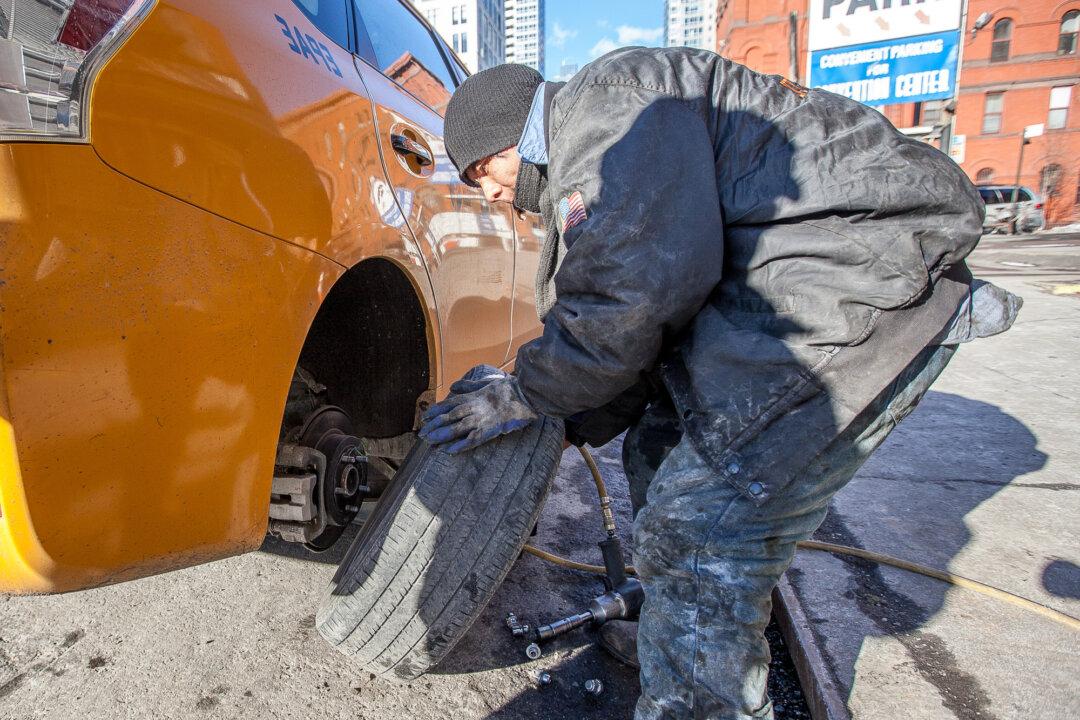NEW YORK—New York drivers are well aware of the problem. They navigate cracks and potholes down their bumpy, congested rides on three out of four major city roads.
Higher vehicle operating costs, traffic crashes, and congestion-related delays add up to $2,300 a year per driver, according to national transportation research group TRIP.
Statewide, the cost of driving on poor quality roads and bridges adds up to $20.3 billion annually.
About 74 percent of the major roads in the New York City urban area are in poor or mediocre condition, meaning there are signs of rutting, cracks, potholes, and extensive distress.
Pothole Problem
“They’re bad, and they’re getting worse,” says Robert Sinclair, spokesman for AAA New York, of New York’s roads. “We’ve had a lot more flat tire calls this year.”
The problems drivers have called about after driving over potholes run the gamut, said Sinclair, from flat tires and wheel damage, to transmission problems, and damaged steering components. Repair costs can run from the hundreds to thousands of dollars.
Bhairavi Desai, executive director of the New York Taxi Workers Alliance, said pothole damage is so common it has become a daily conversation. It has become a safety issue because driving into a pothole can cause a dangerous sudden stop on a crowded road. Drivers may also get stranded on a deserted road.
“The drivers work long hours—stressful hours—and they’re often out in the middle of the night where there might not be a lot of people,” Desai said.
The driver may then have to take the time to replace the tire if there is a spare, at the expense of the fare the driver could have gotten during that time. In a worse case scenario, the driver has to call a mechanic or supplier, and wait.
Winter weather has not been kind to the city’s roads. NYC’s Department of Transportation has worked extensively to keep roads smooth this year, filling a record 140,848 potholes in 2014 already.
Potholes form when the gravel underneath the asphalt of a road freezes, causing it to contract, making it vulnerable to collapse under the pressure of a car.
“We are particularly worse off because of the large trucks on our roads,” Sinclair said. While most cities rely on freight rail, 96 percent of freight in New York City is transported by truck. Thus, the cost incurred to the average New York City driver is higher than that of any other New York region.
An 18-wheeler can weigh up to 100,000 pounds, about 20–25 times heavier than a passenger car, but the damage caused is equivalent to 9,600 cars, according to a Government Accountability Office study.
“These conditions are only going to get worse if greater funding is not made available at the state and federal levels,” writes TRIP Executive Director Will Wilkins.
Federal Funding
According to the World Economic Forum, the United States has dropped 16 spots to number 25 out of 144 in global competitiveness because of its lack of infrastructure.
President Barack Obama announced a four-year transportation bill Wednesday. Without congressional support, the current federal fund for highway and transit aid will expire in October.
That means starting the end of this summer, road and bridge projects will be delayed and postponed until the funding is there, Wilkins said.
The current two-year law, MAP-21, has a funding stream of $109 billion. The new four-year bill is for $302 billion, including $150 billion dedicated to the Highway Trust Fund. Officials have criticized two-year bills, since planning for large scale projects takes closer to five or six years.
The Highway Trust Fund has relied on the federal gas tax, which in recent years has not brought in as much as it was budgeted for. The tax hasn’t been raised in 20 years, and thus not indexed to inflation. Obama is proposing business tax reform to fund the Highway Trust instead.
Obama is also announcing $600 million in funding for Transportation Investment Generating Economic Recovery (TIGER) grants to fund local transportation projects.





